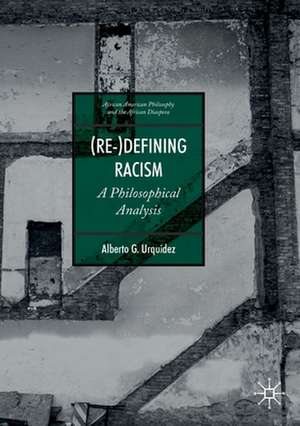(Re-)Defining Racism: A Philosophical Analysis: African American Philosophy and the African Diaspora
Autor Alberto G. Urquidezen Limba Engleză Paperback – 26 aug 2021
| Toate formatele și edițiile | Preț | Express |
|---|---|---|
| Paperback (1) | 531.07 lei 6-8 săpt. | |
| Springer International Publishing – 26 aug 2021 | 531.07 lei 6-8 săpt. | |
| Hardback (1) | 536.49 lei 6-8 săpt. | |
| Springer International Publishing – 10 mai 2020 | 536.49 lei 6-8 săpt. |
Preț: 531.07 lei
Preț vechi: 624.79 lei
-15% Nou
Puncte Express: 797
Preț estimativ în valută:
101.62€ • 108.67$ • 84.73£
101.62€ • 108.67$ • 84.73£
Carte tipărită la comandă
Livrare economică 17 aprilie-01 mai
Preluare comenzi: 021 569.72.76
Specificații
ISBN-13: 9783030272593
ISBN-10: 3030272591
Pagini: 421
Ilustrații: XIII, 421 p.
Dimensiuni: 148 x 210 mm
Greutate: 0.52 kg
Ediția:1st ed. 2020
Editura: Springer International Publishing
Colecția Palgrave Macmillan
Seria African American Philosophy and the African Diaspora
Locul publicării:Cham, Switzerland
ISBN-10: 3030272591
Pagini: 421
Ilustrații: XIII, 421 p.
Dimensiuni: 148 x 210 mm
Greutate: 0.52 kg
Ediția:1st ed. 2020
Editura: Springer International Publishing
Colecția Palgrave Macmillan
Seria African American Philosophy and the African Diaspora
Locul publicării:Cham, Switzerland
Cuprins
Ch.1. Introduction: Summary of the Argument.- Ch.2. Introduction: Toward a Conventionalist Framework.- Ch. 3. Re-defining “Definition”: An Argument for Conventionalism.- Ch. 4. Re-defining “Meaning”: Defending Semantic Internalism Over Externalism.- Ch. 5. Re-defining “Disagreement”: Rationality Without Final Solutions.- Ch. 6. Re-defining “Philosophical Analysis”: Not Descriptive Analysis, Or Conservatism, But Pragmatic Revisionism.- Ch. 7. Adequacy Conditions for a Prescriptive Theory of Racism: Toward an Oppression-Centered Account.- Ch. 8. Racial Oppression and Grammatical Pluralism: A Critique of Jorge Garcia on Racist belief.- Ch. 9. Concluding Note.
Recenzii
“Urquidez carefully works through a massive body of literature and thought, and offers a compelling critique of the overlapping discursive spheres that will appeal to critics on various levels.” (George N. Fourlas, Ethical Theory and Moral Practice, Vol. 24, 2021)
“Alberto G. Urquidez’s (Re-) Defining Racism, is a masterful work in conceptual explication … . Urquidez has contributed a great deal to the academic philosophical tradition of Philosophy of Race and others will doubtless take up extensive discussion ofmany aspects of this seminal work.” (Naomi Zack, Ethical Theory and Moral Practice, Vol. 24, 2021)
Notă biografică
Alberto G. Urquidez is currently a CFD Postdoctoral Fellow in Philosophy at Bowdoin College, USA. .
Textul de pe ultima copertă
What is racism? is a timely question that is hotly contested in the philosophy of race. Yet disagreement about racism’s nature does not begin in philosophy, but in the sociopolitical domain. Alberto G. Urquidez argues that philosophers of race have failed to pay sufficient attention to the practical considerations that prompt the question “What is racism?” Most theorists assume that “racism” signifies a language-independent phenomenon that needs to be “discovered” by the relevant science or “uncovered” by close scrutiny of everyday usage of this term. (Re-)Defining Racism challenges this metaphysical paradigm. Urquidez develops a Wittgenstein-inspired framework that illuminates the use of terms like “definition,” “meaning,” “explanation of meaning,” and “disagreement,” for the analysis of contested normative concepts. These elucidations reveal that providing a definition of “racism” amounts to recommending a form of moral representation—a rule for the correct use of “racism.” As definitional recommendations must be justified on pragmatic grounds, Urquidez takes as a starting point for justification the interests of racism's historical victims.
Caracteristici
Analyzes the concept of racism from a philosophical perspective Develops a Wittgenstein-inspired framework that illuminates the use of terms, like “definition,” “meaning,” “explanation of meaning,” and “disagreement,” in respect to contested normative concepts Written for philosophers of race and racism, philosophers of language and Wittgensteinian philosophers, and metaphilosophers interested in the nature of conceptual analysis






